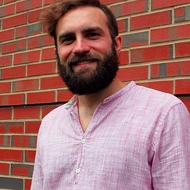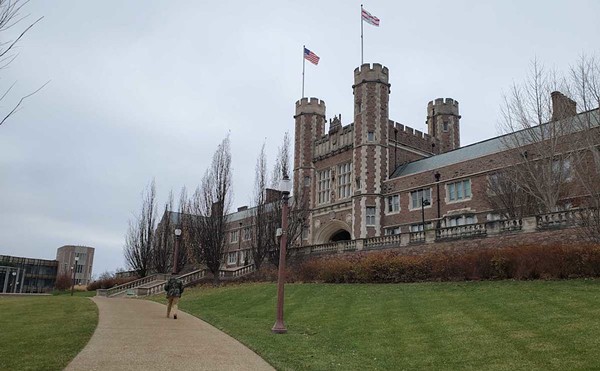
COURTESY LORI CURRY
Lori Curry is giving up her anonymity to push her advocacy for Missouri inmates forward.
This story was sponsored in part by a Fund for Investigative Journalism grant.
In December 2019, Lori Curry’s boyfriend, who has been incarcerated for almost two decades, sought medical treatment from prison medical staff. The health-care workers told him his condition wasn’t serious and that he risked being written up for a disciplinary infraction if he sought help again. When Curry, 39, of Joplin heard what happened she was incensed. Wanting to vent her frustration at the Missouri Department of Corrections but at the same time worried her criticism might blow back on her boyfriend, she created a new twitter handle @MissouriPrison and tweeted anonymously about the ordeal. She didn’t know it at the time, but the project she’d just started would dominate her life in 2020 and become a bona fide advocacy organization in 2021.
In those first weeks, Curry tweeted mostly about her boyfriend’s issues with Corizon Health, the health-care provider for all prisons in the state. Before long, she began hearing from others with incarcerated loved ones who were dealing with similar issues. She did what she could to spread awareness of what she saw as inadequate health care for Missourians in prison, hoping that if the right people became aware of the problem it could get fixed.
Then something unexpected happened. She started getting messages from current and former MODOC employees, corrections officers in particular, who had their own gripes with the department but were wary of airing them publicly.
“I remember the very first message I got from an employee,” Curry says. “I thought, ‘Is this some practical joke?’ I was very taken aback. I just, I did not expect them to want to work with me or give me information.”
Without intending to, Curry found herself as one of the few lines of communications for inmates and corrections officers to get information to the public without fear of retribution.
She quickly discovered the interests of the two groups were not always as diametrically opposed as popular films and TV make it seem. Inmates who contacted Curry often complained of a lack of access to resources and programs. The COs complained of being understaffed, stretched thin and continuously asked to do more with less.
The information Curry makes public is often of the sort that may not be newsworthy to the general public but is hugely important to incarcerated people and their families. For instance, last week Curry posted a story to the Missouri Prison Reform website about inmates not having access to grievance forms, which are the primary means by which an inmate can seek redress when they feel they’ve been wronged.
Much of what she posts about these days is COVID-related. She’s made public numerous messages from inmates who say they’ve been in close quarters with those who have tested positive or are showing symptoms of COVID. Earlier this month, she posted a letter from a person who until recently worked for the MODOC claiming that the department was not following its own viral containment plan. The @MissouriPrison account has also become one of the most accessible ways to track the daily changes in COVID cases in the system.
Curry says she’s able, to some extent, to vet the sources of information she receives because both public employee and inmate identities are publicly available. If she does pass along something that’s shown to be inaccurate, she posts a correction immediately. Journalists from Kaiser Health News, the Kansas City Star and the RFT have used information posted by Curry as a basis for further reporting.
Earlier this year, the St. Louis-based civil rights attorney Chelsea Merta gave Curry a crash course in submitting Sunshine requests, which Curry now does regularly for information on inmate deaths.
“She is such a force of nature,” Merta says. “I can show her how to do something, give her a tool, and she just runs with it.”
Curry has also recently connected with Sami Abdel-Salam, a Bolivar, Missouri, native and professor of criminal justice at Westchester University in Pennsylvania. He reached out to Curry offering his help after coming across her account on social media.
“I'm more likely to run into somebody who's been incarcerated that has come out that's trying to do something to change the system,” Abdel-Salam says. “I don't think I've ever encountered anybody, personally, who has not been incarcerated that has gone as far as [Curry] has, in terms of advocacy for people who are. I'm sure they exist. But she’s the first I’ve met.”
In her prior life, Curry worked a series of caretaking jobs including with adults who have developmental disabilities and children with autism. She made a career change to medical coding and billing, but she began experiencing seizures which forced her to stop working. Around the same time, a friend whose boyfriend was in prison said that her boyfriend knew a guy on the inside looking for a pen pal. Would Curry be interested? Newly out of work and with some time on her hands, she said, sure. Why not?
She didn’t know how old he was or what he was in prison for. They exchanged letters, then talked on the phone.
“He was so positive,” she says. “I think about that and to this day, I'm always like, ‘How are you so positive in your environment that you're in?’ I get down, and I’m out here.”
She went and met him a little more than a month after they started communicating. Curry adds, “He was really handsome.”
Curry asked for her significant other’s name to be kept out of this piece but did say that he’s been in prison for almost twenty years for an armed robbery committed as a young man. And he has almost another twenty years left on his sentence. Neither he nor Curry make any excuses for his crime but, she says, “I don’t know what good it’s doing to keep him in that environment. He’s long ago a changed man.”
In recent weeks, Curry faced the dilemma of her anonymity. It had allowed her to post freely, but it also prevented her from growing her work as much as she would like. As more journalists, activists and academics reach out to her, she envisions a more formal role for her advocacy. But that’s hard if not impossible while operating as a faceless Twitter account. Even simple exchanges are tricky. She recently found herself at a very modern crossroads: She had scheduled a Zoom meeting with a lawyer and had to decide if she was going to turn her camera on or not. She chose to turn it on.
Curry has decided to make Missouri Prison Reform into a 501c3 nonprofit, which will enable it to collect donations and apply for grants. She hopes to use the money to set up a pen pal program for inmates and help families of incarcerated people with small expenses, among other goals. But registering a nonprofit also means putting her name in the public record. So she is stepping out from behind the shield of anonymity in hopes of advancing the work she began more than a year ago.
“In order for us to move forward and do the things we want to do, it’s just going to happen,” she says. “People are going to find out who I am. I’m ready to be able to do more. And not hide.”
Ryan Krull is a freelance journalist and assistant teaching professor in the department of communication and media at University of Missouri-St. Louis.
Editor's note: An earlier version of this story included inconsistent spellings of Lori Curry's last name. We regret the error.






